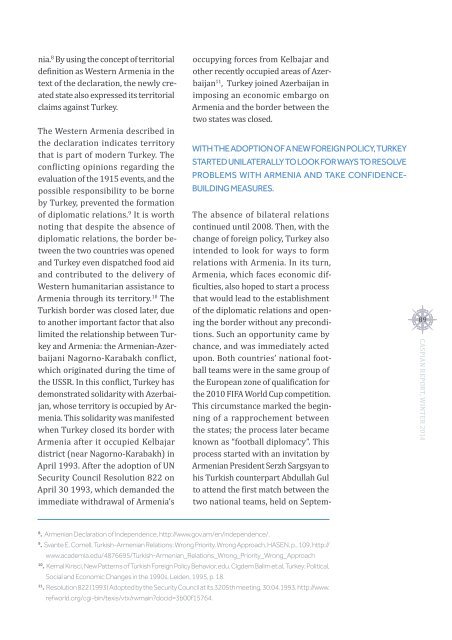Caspian Report - Issue 06 - Winter 2014
Create successful ePaper yourself
Turn your PDF publications into a flip-book with our unique Google optimized e-Paper software.
nia. 8 By using the concept of territorial<br />
definition as Western Armenia in the<br />
text of the declaration, the newly created<br />
state also expressed its territorial<br />
claims against Turkey.<br />
The Western Armenia described in<br />
the declaration indicates territory<br />
that is part of modern Turkey. The<br />
conflicting opinions regarding the<br />
evaluation of the 1915 events, and the<br />
possible responsibility to be borne<br />
by Turkey, prevented the formation<br />
of diplomatic relations. 9 It is worth<br />
noting that despite the absence of<br />
diplomatic relations, the border between<br />
the two countries was opened<br />
and Turkey even dispatched food aid<br />
and contributed to the delivery of<br />
Western humanitarian assistance to<br />
Armenia through its territory. 10 The<br />
Turkish border was closed later, due<br />
to another important factor that also<br />
limited the relationship between Turkey<br />
and Armenia: the Armenian-Azerbaijani<br />
Nagorno-Karabakh conflict,<br />
which originated during the time of<br />
the USSR. In this conflict, Turkey has<br />
demonstrated solidarity with Azerbaijan,<br />
whose territory is occupied by Armenia.<br />
This solidarity was manifested<br />
when Turkey closed its border with<br />
Armenia after it occupied Kelbajar<br />
district (near Nagorno-Karabakh) in<br />
April 1993. After the adoption of UN<br />
Security Council Resolution 822 on<br />
April 30 1993, which demanded the<br />
immediate withdrawal of Armenia’s<br />
occupying forces from Kelbajar and<br />
other recently occupied areas of Azerbaijan<br />
11 , Turkey joined Azerbaijan in<br />
imposing an economic embargo on<br />
Armenia and the border between the<br />
two states was closed.<br />
WITH THE ADOPTION OF A NEW FOREIGN POLICY, TURKEY<br />
STARTED UNILATERALLY TO LOOK FOR WAYS TO RESOLVE<br />
PROBLEMS WITH ARMENIA AND TAKE CONFIDENCE-<br />
BUILDING MEASURES.<br />
The absence of bilateral relations<br />
continued until 2008. Then, with the<br />
change of foreign policy, Turkey also<br />
intended to look for ways to form<br />
relations with Armenia. In its turn,<br />
Armenia, which faces economic difficulties,<br />
also hoped to start a process<br />
that would lead to the establishment<br />
of the diplomatic relations and opening<br />
the border without any preconditions.<br />
Such an opportunity came by<br />
chance, and was immediately acted<br />
upon. Both countries’ national football<br />
teams were in the same group of<br />
the European zone of qualification for<br />
the 2010 FIFA World Cup competition.<br />
This circumstance marked the beginning<br />
of a rapprochement between<br />
the states; the process later became<br />
known as “football diplomacy”. This<br />
process started with an invitation by<br />
Armenian President Serzh Sargsyan to<br />
his Turkish counterpart Abdullah Gul<br />
to attend the first match between the<br />
two national teams, held on Septem-<br />
89<br />
CASPIAN REPORT, WINTER <strong>2014</strong><br />
8<br />
. Armenian Declaration of Independence, http://www.gov.am/en/independence/.<br />
9<br />
. Svante E. Cornell, Turkish-Armenian Relations: Wrong Priority, Wrong Approach, HASEN, p., 109, http://<br />
www.academia.edu/4876695/Turkish-Armenian_Relations_Wrong_Priority_Wrong_Approach<br />
10<br />
. Kemal Kirisci, New Patterns of Turkish Foreign Policy Behavior, edu. Cigdem Balim et al, Turkey: Political,<br />
Social and Economic Changes in the 1990s, Leiden, 1995, p. 18.<br />
11<br />
. Resolution 822 (1993) Adopted by the Security Council at its 3205th meeting, 30.04.1993, http://www.<br />
refworld.org/cgi-bin/texis/vtx/rwmaindocid=3b00f15764.










